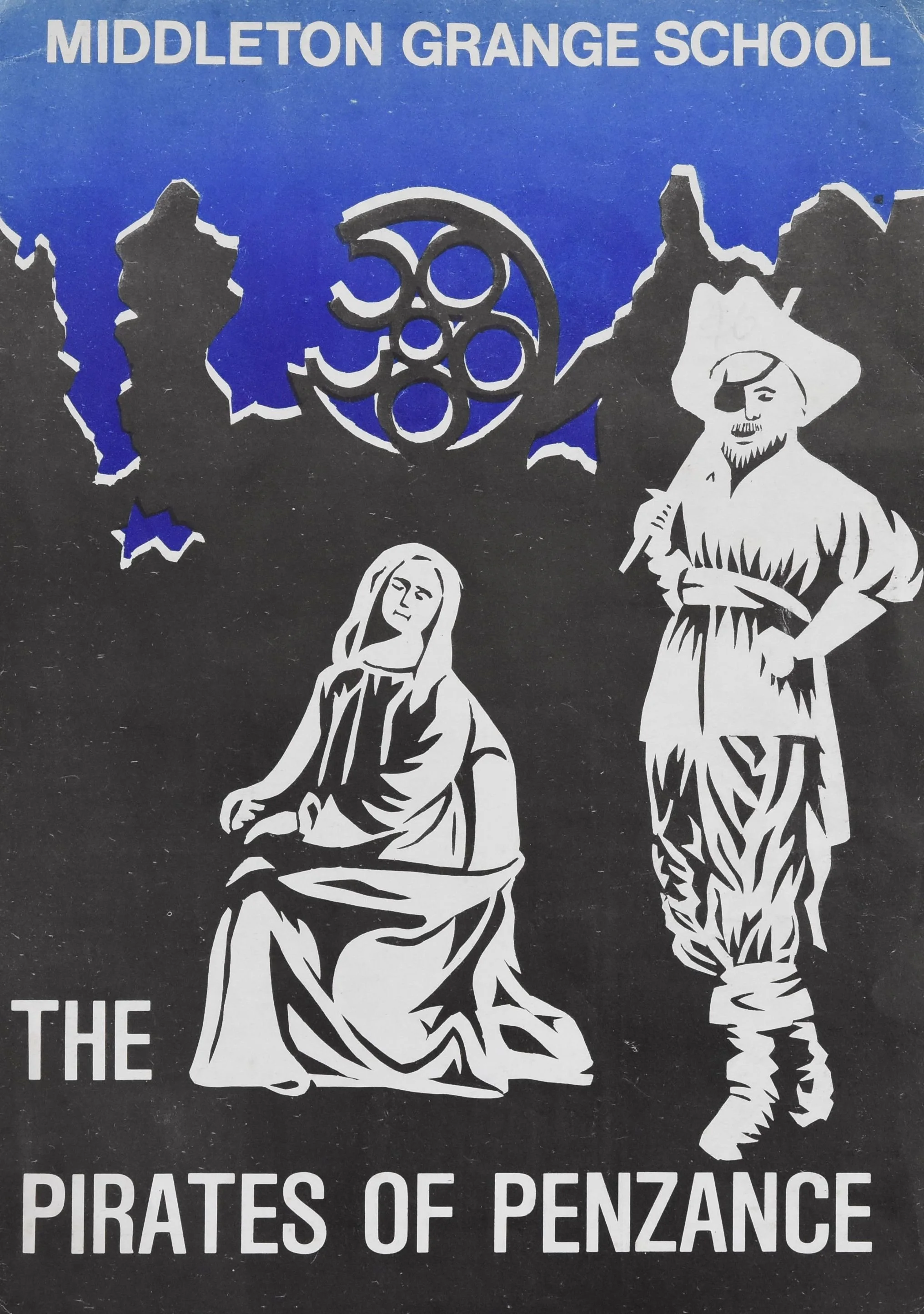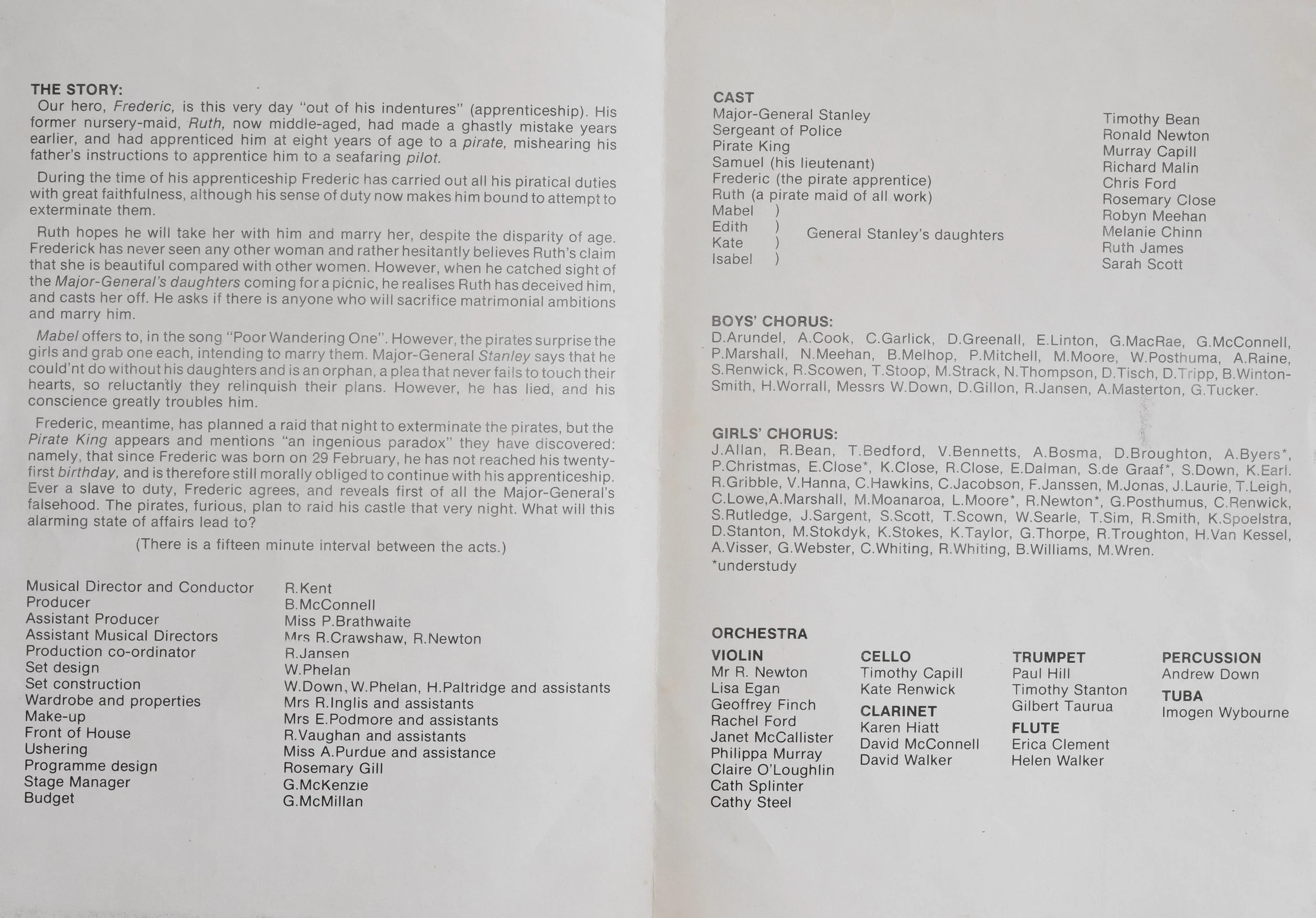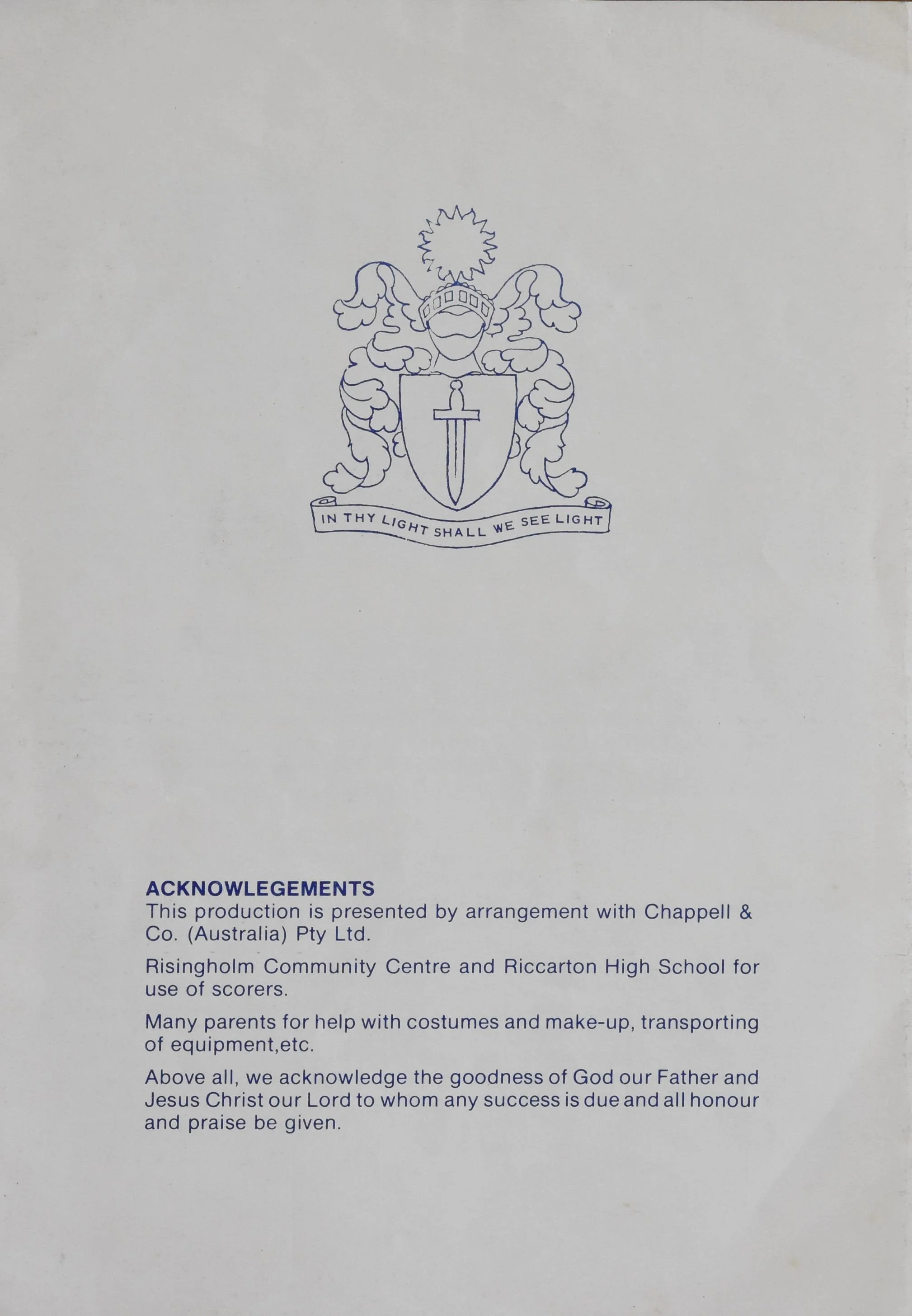












The Pirates of Penzance was premiered in Paignton, Devonshire, England on the 30th December 1879 so as to secure the English copyright. This operetta was first performed in the United States in New York City on 31st December 1879 and it debuted in London on the 3rd April 1880 at the Opera Comique running for 363 performances. It was the fifth operetta written by Gilbert and Sullivan. It is one of Gilbert and Sullivan’s most popular operettas, as popular as The Mikado and H.M.S. Pinafore.
By D'Oyly Carte Opera Company - Gilbert and Sullivan: The Official D'Oyly Carte Picture History, Public Domain, https://commons.wikimedia.org/w/index.php?curid=114800378
On the 27th May 1880 the Lyttelton Times says that Gilbert and Sullivan arrived in England on March 15th, and on arriving immediately began rehearsals of The Pirates of Penzance at the Opera Comique. The Observer dated the 25th September states ‘the popularity of the Pirates of Penzance is already on the wane in London’.
Paignton was chosen for the first UK performance because it was where D’Oyly Carte’s touring company happened to be at the time. It was not a particularly sophisticated performance, most of them appeared in their Pinafore costumes. The pirates where denoted by having handkerchiefs tied round their heads, the policemen were dressed as sailors and instead of lanterns they carried copies of the music because they hadn’t had time to learn their parts.
As mentioned before, Pirates of Penzance first premiered in London and because of the lack of copyright protection to foreigners in the United States, Gilbert and Sullivan were hoping to avoid the same problems they had had with Pinafore. Gilbert said at the time “I will not have another libretto of mine produced if the Americans are going to steal it. It’s not that I need the money so much, but it upsets my digestion”. There had been numerous companies in the United States preforming Pinafore which were unauthorised. Many of these productions did not perform it as written and did not pay any royalties to Gilbert and Sullivan. By having the first production of The Pirates of Penzance in New York they hoped to stop any ‘copyright piracy’ and they also delayed the publication of the score and libretto. Although they were successful in obtaining the profits from this first production in the United States, they failed to control the American performance copyrights after this. According to Leslie Baily in his book The Gilbert and Sullivan book ‘a Mr Lothian offered Gilbert and Sullivan $25,000 in February 1880 for the rights to play the Pirates of Penzance in Boston and New England, but they refused as they preferred to send out their own touring companies’. The Lyttelton Times dated 9th April 1880 states though ‘no libretto of The Pirates of Penzance has so far been published. The authors are said to have refused £1000 for the right to perform it at the Boston Theatre. They intend to send a company of their own to that city’.
W J H [?] Ferens, cast member of The Pirates of Penzance by the Oamaru Amateur Opera Company at the Public Hall, November 27th and 28th 1883. North Otago Early Settlers’ Association Portrait Collection
The Lyttelton Times on 21st April 1880 have an article concerning the copyright of The Pirates of Penzance. It explains the complicated legal argument regarding the copyright. Apparently, Gilbert and Sullivan were not only concerned about the copyright but also the ‘piratical performances’. According to this article, ‘there are plenty of managers that have been nightly at Fifth Avenue and have practically obtained the libretto and a version of the music’.
On the 7th May 1880, the Auckland Star discussed the copyright for The Pirates of Penzance. It says ‘Gilbert and Sullivan could have protected their opera in this country beyond question by copyrighting and publishing it, because foreigners may copyright whatever they write here; but by doing so they would have lost all rights in England’. And this in the Lyttelton Times on the 8th May 1880 ‘ a gentleman of Troy, America, wrote to Mr W. S. Gilbert asking : “Can you inform me where I can buy a copy of the words and music of The Pirates of Penzance as I want to produce it immediately?” Mr Gilbert was so overwhelmed with indignant astonishment that, for the first and only time in his life, he fainted. A number of sympathising friends hastened to empty the nearest pitcher of ice-water on his head, and the latest account gave hope of a speedy restoration of the talented author to his normal condition. It requires the ceaseless remonstrance of the Board of Alderman of New York to prevent Mr Gilbert taking the next steamer back to England’.
On the 7th May 1881 in the Otago Witness it says ‘a band of amateur negro minstrels contemplate producing a pirated (American) version of The Pirates of Penzance. Litigation in the distance’. Another instance of a pirated version is written in the New Zealand Times on the 13th May 1881. It states ‘The Pirates of Penzance operetta has already been burlesqued at Tony Pestor’s Theatre in New York under the title of “Pie Rats of Penn Yann”. Nearly all the original music is introduced, with merely colourable variations’.
On the 29th October 1880 the Lyttelton Times tells that Chappell and Co. have purchased the Pirates of Penzance right of publication but that it would not be on sale until the following year, which would be after the new operetta being performed in New York. It goes on to say ‘when once the work is printed or published, any American manager will be at liberty to produce it’. One assumes that this article is talking about an authorised production of the Pirates of Penzance in New York.
Cover from the production of “The Pirates of Penzance” by The Really Authentic Gilbert and Sullivan Trust.
According to the South Canterbury Times on the 5th June 1880 there were about thirty to forty companies performing The Pirates of Penzance in the United States.
Once Pinafore was a financial success, Gilbert and Sullivan formed a new partnership with Richard D’Oyly Carte which resulted in the three of them dividing the profits equally amongst themselves after the expenses had been paid. Concerning profits the Otago Witness on the 28th April state that Gilbert and Sullivan (and presumably D’Oyly Carte as well) had been receiving about £1000 a week in profits from the production of The Pirates of Penzance in New York. According to the Lyttelton Times on the 9th October ‘it is now stated on authority that Messers Gilbert and Sullivan divided £8500 as the profits of their American season with The Pirates of Penzance.
Since Gilbert and Sullivan were no longer bound to the “Comedy Opera Company” they were able to cast the actors themselves and for these actors, roles were written for them. Gilbert was the stage director for the operettas, and he was a proponent of naturalism in acting, which was not common at the time.
Ferens family, cast members of The Pirates of Penzance by the Oamaru Amateur Opera Company at the Public Hall, November 27th and 28th 1883. W H Ferens [?] L Ferens, G A [?] Ferens. From the North Otago Early Settlers’ Association Portrait Collection.
In November 1879 Gilbert, Sullivan and Carte sailed to the United States with a company to play Pinafore and Pirates of Penzance. When Sullivan arrived in the States, he found that he had left the sketches for the music for Act 1 in London, so he had to write the score from memory or compose new numbers. As he so often did, Sullivan left the writing of the overture until the last moment and in this case, he sketched it out, giving these details to the company’s music director to complete it. The above differs from what is written in Leslie Baily’s The Gilbert and Sullivan Book as it states that Sullivan wrote to his mother saying “I fear I have left all my sketches of the last Act at home, as I have searched everywhere for them. I would have telegraphed them, but they could not have arrived in time. It is a great nuisance as I have to rewrite it all now and can’t recollect every number I did. We hope to get it out in a fortnight from next Saturday”.
Leslie Baily’s book introduces The Pirates of Penzance very well by saying that ‘someone has said that The Pirates of Penzance is H.M.S. Pinafore transferred to dry land. Instead of satire on naval discipline and tradition there’s satire on the army, the police and the Englishman’s sense of duty. He goes on to say ‘the basic formula is much the same. The treatment is very different. The Pirates is more elaborate in plot and presentation, in words and in music, and this is the more remarkable when we recall the conditions under which it was written in New York during the closing days of 1879, with a very ‘seedy’ (his own word) Sullivan writing against the clock, not only to meet the advertised date of production at the Fifth Avenue Theatre, but the simultaneous performance at Paignton’.
Overall, the critics reviewed The Pirates of Penzance favourably. One review in the Globe on 3rd April 1880 states ‘of course the first question is whether it is like ‘Pinafore’. It is very different, and very much better, stronger and cleverer. London will go wild over many of the points which only cause hearty laughter here: for Messers Sullivan and Gilbert have not been tempted into any local illusions, and have The Pirates thoroughly English, from the first words to the last’.
In the New Zealand Herald dated 17th March 1880 it states that The Pirates of Penzance is an immense success in New York. As it says, one performance was given in a Devonshire county town to preserve the English copyright however considering the music had not been published in England nor had it been performed in London, the verdict on the operetta could not be given. It comments ‘the piece is said to be a skit on melodrama and popular novels of the penny-dreadful order’.
On the 11th June 1880 there is a review for The Pirates of Penzance London performance. It says that ‘The pirates of Penzance shows conclusively that the end of the tether has not yet been reached. As we have frequently took occasion to observe, the ability of Mr W. S. Gilbert consists in his humourous distortions of the events and characters of ordinary life. His capacity for turning the world upside down is almost unique’. The reviewer is less praising of Sullivan’s music, describing it as a ‘rechauffe’ of The Sorcerer and Pinafore although they do concede that there ‘are one or two numbers which are superior to anything he has hitherto accomplished’.
Jim Pawson as Major-General Stanley from a production of Pirates of Penzance - Photograph taken by Mark Luder Lampe. Tesla Studios :Negatives of Wanganui and district taken by Alfred Martin, Frank Denton and Mark Lampe (Tesla Studios). Ref: 1/1-022464-F. Alexander Turnbull Library, Wellington, New Zealand. /records/23024446
Nevertheless, another article in the Otago Witness on the 19th June 1880 is more effusive in its praise for Sullivan’s music. It states ‘the result is that we have music worthy in its artistic qualities to rank with some of the best efforts of the greatest composers, while it has a piquant freshness and buoyancy such as no other modern musician has equalled’. It goes on to say that ‘Mr Gilbert has parodied the olde form of melodrama in the same amusing and characteristic fashion as Mr Sullivan has treated the pompous style of modern opera’.
The Otago Witness of the 26th June 1880 contains a round-up of the reviews of some of the newspapers in the United Kingdom for The Pirates of Penzance. It is as follows ‘The Pall Mall Gazette says that ‘in the new style in which Mr Sullivan has marked out for himself, this is the best he has written’. The Standard says ‘the gem of the opera is an exquisite little madrigal in G, three-four time, scored for strings, “Oh, leave me not to live’ sung by Mable and Frederic. Mr Sullivan has written nothing more tender and graceful than this beautiful melody, which contains all the best characteristics of old English music’. The Globe thinks the music a distinct advance on Mr Sullivan’s former efforts in this style. The Telegraph, which asserts that the music is a ‘distinct improvement’ upon that of the other operas, says that every page of the libretto provokes laughter, and that the verses for music are all capital, and just what a libretto should supply. The Times, while praising the opera, calls The Sorcerer the masterpiece of its joint authors’.
The New Zealand Times on the 11th May 1881 mentions that The Pirates of Penzance was still running at ‘Home’ and that even though ‘the music is not nearly as catching as that of Pinafore, it grows on the hearer and it will always remain a favourite. The public here no doubt are awaiting its production in Wellington with no small degree of interest’.
On the 6th June 1881 the Lyttelton Times tells that ‘after a brilliant career of twelve months, The Pirates of Penzance was to be played for the last time at the Opera Comique, London on April 2’.
Hawkes Bay Herald 17th June 1881
An interesting snippet in the Lyttelton Times on the 1st May 1880 states that ‘The Pirates of Penzance will be produced in German at an early day at the Thalia Theatre, New York, under the immediate direction of the composers’.
The lovepenzance.co.uk website discusses that when The Pirates of Penzance was first performed, Penzance in Cornwall was ‘a peaceful and fashionable seaside town. Though still considered by many to be a ‘wild’ outpost in deepest Cornwall, it had become highly respectable: a perfect setting for strict Victorian manners in action. It’s this idea of respectability that is parodied throughout the production, as the pirates and Penzance residents negotiate what it really means. Here, it seems, there’s little difference between the criminals and cutthroats aboard a pirate ship and the honourable gentlemen on land’.
The Pirates of Penzance contains one of Sullivan’s best-known melodies, the patter song “I Am the Very Model of a Modern Major-General’.
The first performance in Australia was on 19th March 1881 at the Theatre Royal in Sydney, the producer being J. C. Williamson. Many New Zealand papers in September 1880 are saying that ‘The Pirates of Penzance is said to be on its way out in charge of a gentlemen who has bought the right to produce it in Australia and New Zealand’. According to the Otago Witness on the 25th September ‘Mr J. C. Williamson is reported to have offered £1000 cash for the right to perform the opera, which is now creating such a rage in America, The Pirates of Penzance. If he succeeds in getting it he will spend £400 upon its production’. In the Evening Post on the 1st March 1881 is says that ‘Mr Williamson has bought from Gilbert and Sullivan the sole right of producing the “Pirates of Penzance” in Australia and New Zealand. He notifies that he will proceed against anyone infringing the copyright’.
Pirates, from a production of Pirates of Penzance - Photograph taken by Mark Luder Lampe. Tesla Studios :Negatives of Wanganui and district taken by Alfred Martin, Frank Denton and Mark Lampe (Tesla Studios). Ref: 1/1-022440-F. Alexander Turnbull Library, Wellington, New Zealand. /records/22721420
The Otago Witness dated 2nd April 1881 states that first performance of the Pirates of Penzance in Australia was at the Theatre Royal in Sydney. The final performance of H.M.S. Pinafore was only two days before. It says ‘there was a crowded audience and all the seats were taken two days previously. The performance was an unqualified success. The music is pleasing, the scenery beautiful and the costumes elegant’.
The Evening Post on the 24th January 1881 has an interesting article stating ‘Mr R. W. Cary has received the music and libretto of Gilbert and Sullivan’s new work “The Pirates of Penzance” – from England and he intends to produce the play with a company of amateurs shortly. Mr Cary’s copy is believed to the first which has arrived in New Zealand’. The New Zealand Times expands on the Evening Post article by saying ‘Mr R. W. Cary, who returned from Napier by S.S. Albion on Sunday night, was agreeably surprised to find waiting for him, at the Post Office, a book parcel from England containing the libretto and musical scores of Gilbert and Sullivan’s new satirical opera “The Pirates of Penzance”. Mr R. W. Cary was the lessee and manager of the Theatre Royal in Wellington.
By February 1881 copies of The Pirates of Penzance have arrived in New Zealand. The New Zealand Times on the 6th April 1881 has an interesting that discusses the number of copies sold of the two operettas, H.M.S. Pinafore and The Pirates of Penzance. It states that ‘since 1878 the publishers of H.M.S. Pinafore had sold over 200,000 copies. The Pirates of Penzance had been published on November 11th 1880 and by the end of the year, 32,000 copies had been sold and that many more were being printed.
On the 12th April 1881 the Auckland Star states that ‘Mr J. C. Williamson declines to grant any rights to produce The Pirates of Penzance in New Zealand, his intention being to come over himself with the company and imported dresses, and scenery now employed in the representation at Sydney’. However, in the Lyttelton Times on the 18th April it says ‘Mr Shepperson and Miss Lydia Howarde are at present in Christchurch, resting on their oars for the time being. Mr Shepperson made an offer of £300 to Mr J. C. Williamson for the sole right to play The Pirates of Penzance in New Zealand, but we understand that the offer was declined, Mr Williamson desiring an offer for a longer term, say not less than six months’. By the 29th April 1881 the New Zealand papers are saying that an offer had been made by Mr W Reynolds to purchase the sole right to produce The Pirates of Penzance throughout New Zealand for six months, which it was thought would be accepted by My Williamson. But then, in the Press on the 4th May 1881, it states that ‘Mr R. W. Carey, (sic) the well-known theatrical manager, has purchased from Mr J. C. Williamson, the sole right to represent the opera The Pirates of Penzance in New Zealand’. Another article in the Evening Post on the 4th May 1881 provides more detail regarding Mr R. W. Cary’s purchase of the copyright of The Pirates of Penzance. The price agreed upon for the sole right to produce the piece in New Zealand for a period of eight months is £500. Mr Cary intends, we believe, to secure a first-class company, and to produce The Pirates of Penzance in Wellington in a few weeks’.
Above are from the Evening Post dated 27th May 1881, Lyttelton Times 12th May 1881 and New Zealand Times 23rd May 1881.
So, in the Evening Post on the 9th May 1881 Mr R. W. Cary is inviting ladies and gentlemen who are willing to assist in the chorus in the production of The Pirates of Penzance to meet at St Georges Hall that evening. And later in the month on the 20th May 1881 the New Zealand Times states ‘Mr Sydney Wolf, R.A.M., has been entrusted with the conductorship of the Pirates of Penzance operetta, now in rehearsal by Mr Cary’s new company, and under his guidance there is every assurance of the first performance in this colony being a triumphant success. The new piece will be produced as speedily as possible consistent with careful preparation and may be looked forward to as the chief coming event in musical topics’.
On the 24th June 1881 in the New Zealand Times it says ‘Mr Cary has had a complete set of scenery painted for The Pirates of Penzance. The work has been well executed by Mr Briggs, whose skill with the brush is well known in Wellington. The whole has been so arranged that it can be easily packed and moved. By this means Mr Cary will be enabled to use it during the trip through the colony which the company will make after completing the season in Wellington’. It is interesting to note in the Evening Post on the 27th June 1881 that Mr R. W. Cary is in the role of The Pirate King. And the role of Ruth was taken by a man, Mr Cecil Riverton and it was noted that some of his songs ‘were spoilt by their being taken too low’.
The above pieces are from the Poverty Bay Standard 7th January 1882
The first performance of The Pirates of Penzance in New Zealand was on the 27th June 1881 and in the Auckland Star on the 28th June 1881 it tells of “The Pirates of Penzance had a crowded house last night, and the piece went off most successfully. Nine-tenths of members of both Houses were there but many say it is not as good as Pinafore’. After running in Wellington the production moved to Christchurch, opening on the 12th July 1881.
Then on the 21st May 1881 the Lyttelton Times says that ‘it is said that Mr D’Oyly Carte is preparing a Pirates of Penzance Company in England for a tour of Australia and New Zealand’.
Lyttelton Times 10th April 1887
Cover of the programme of ‘The Pirates of Penzance’ that was performed by the Hamilton Operatic Society from 21st September to 12 October 1991.
From personal copy of NZ Sporting and Dramatic Review 19th June 1925



Programme from personal collection.
en.wikipedia.org/wiki/The_Pirates_of_Penzance
www.britannica.com/topic/The-Pirates-of-Penzance
www.lovepenzance.co.uk/activities/the-pirates-of-penzance/
The Gilbert and Sullivan Book Leslie Baily published by Spring Books 1966


















